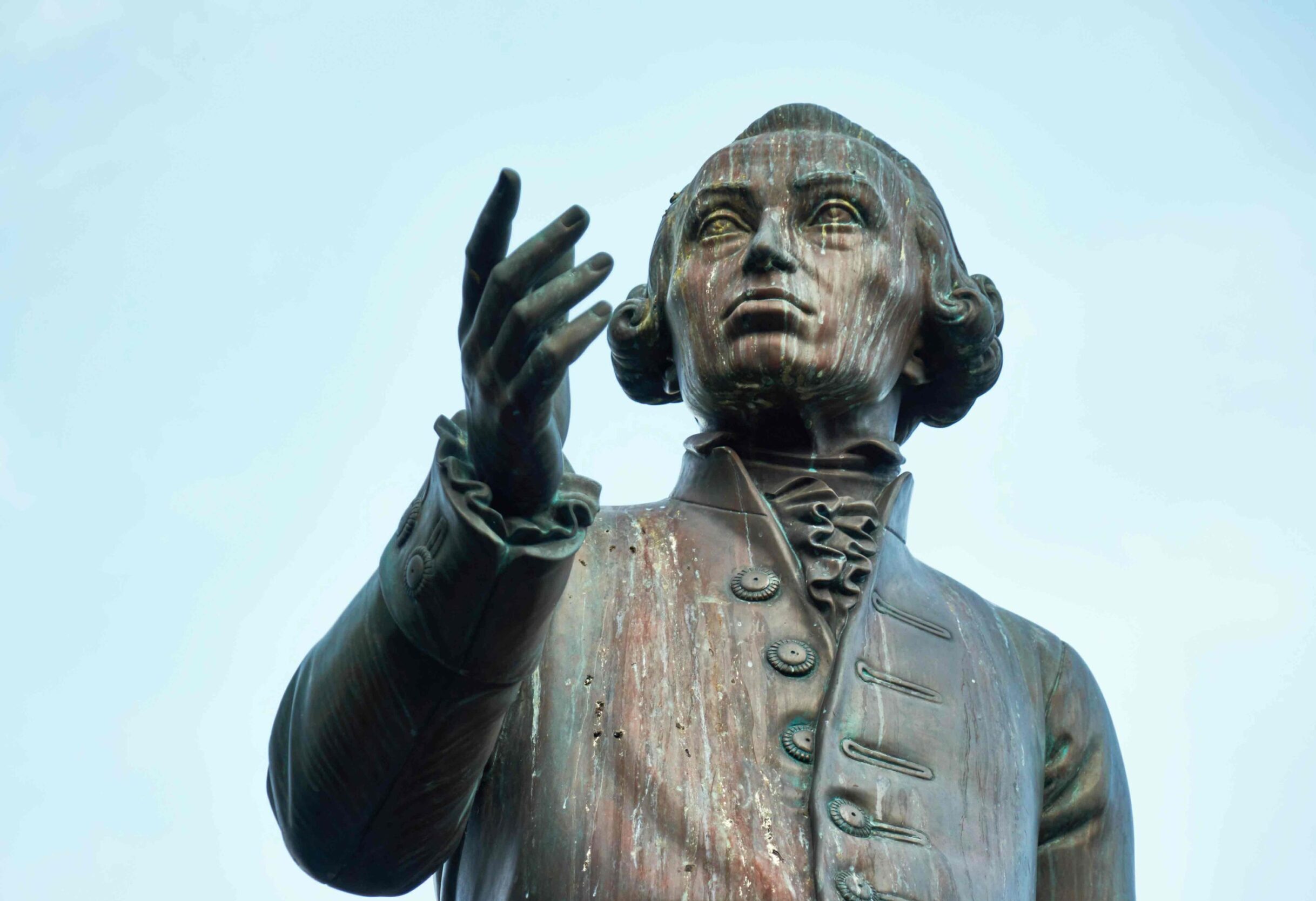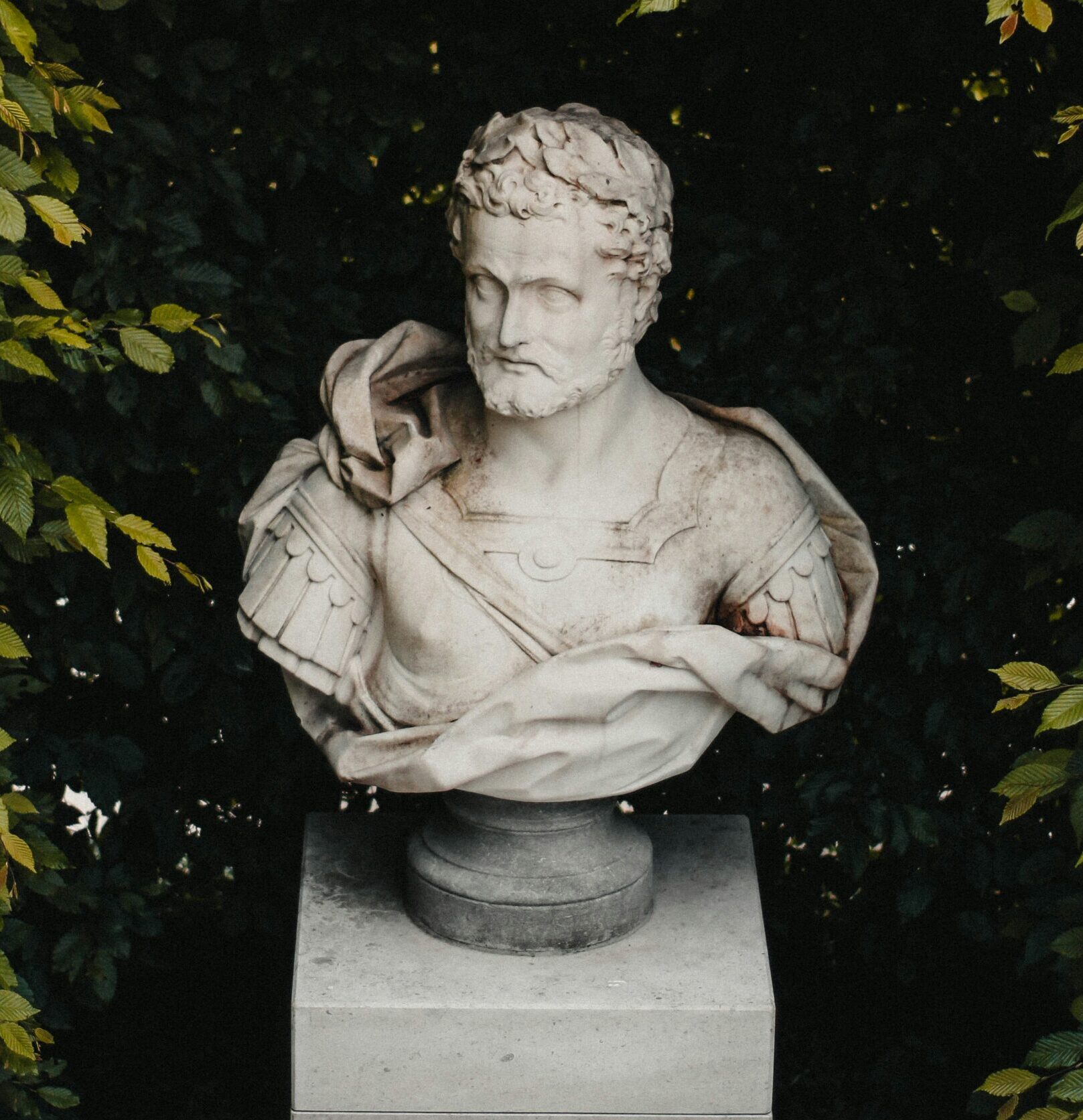Immanuel Kant (1724–1804) is widely regarded as one of the most influential philosophers in Western thought. His work fundamentally reshaped metaphysics, epistemology, ethics, and aesthetics, laying the groundwork for modern philosophy. Born in Königsberg, Prussia (now Kaliningrad, Russia), Kant lived a modest and disciplined life, never traveling far from his hometown, yet his intellectual reach was boundless. . Born April 22, 1724, Immanuel Kant wasn’t exactly living the rockstar life. His dad made harnesses for horses, and his mom was all about that strict Lutheran faith—think “say your prayers and eat your veggies” vibes. Little Kant was a brainiac from the jump, soaking up books at the University of Königsberg. But life wasn’t all smooth sailing—when his dad died, he had to hustle as a tutor for rich kids just to eat. By 1770, though, he was back at the uni, rocking the professor gig and ready to change the game.
Kant’s life was lowkey goals. He never married, never traveled more than a few miles from home, and was so obsessed with routine that locals literally set their clocks to his daily walks—3:30 p.m., rain or shine, like a human TikTok schedule. But don’t let the chill vibes fool you—this guy’s brain was a nonstop fireworks show.
His career splits into two eras: the “pre-critical” days (pre-1770), where he was vibing with the big thinkers of his time, and the “critical” era (post-1770), where he went full supernova and rewrote the rules of philosophy. Let’s unpack the good stuff.

The Big Three: Kant’s Epic Trilogy
Kant didn’t mess around—he dropped three massive books that are basically the Avengers of philosophy. Here’s the lineup:
- Critique of Pure Reason (1781, remixed in 1787)
- The Plot: How do we know stuff? Kant’s out here asking the big questions—way beyond “what’s for lunch?”
- The Twist: He says our brains aren’t just sponges soaking up the world. Nope, they’re like VR headsets, shaping what we see. Mind. Blown.
- Critique of Practical Reason (1788)
- The Plot: What’s right and wrong? Kant’s got a rulebook for being a good human, no Bible or “because I said so” required.
- The Twist: It’s all about logic, fam—act like your choices could be a universal TikTok trend.
- Critique of Judgment (1790)
- The Plot: Why do sunsets slap so hard? Kant’s digging into art, beauty, and why nature feels like it’s got a purpose.
- The Twist: Beauty’s in your head, but it’s still a vibe everyone can get behind.
Kant’s philosophy is often summarized as “transcendental idealism,” a theory that argues our experience of reality is structured by the mind itself. He sought to resolve the disputes between rationalists (who claimed knowledge comes from reason alone) and empiricists (who argued knowledge comes from sensory experience). Kant proposed a middle path: while all knowledge begins with experience, the mind actively shapes this experience using innate structures and categories. Here is much more explanation
The Critique of Pure Reason (1781, revised 1787)
One of Kant’s most famous works, The Critique of Pure Reason, attempts to answer the question: How do we acquire knowledge?
- A Priori vs. A Posteriori Knowledge: Kant distinguishes between a priori knowledge (independent of experience) and a posteriori knowledge (dependent on experience).
- Phenomena vs. Noumena: He introduces the idea that we can only experience things as they appear to us (phenomena) but can never access things as they are in themselves (noumena).
- The “Copernican Revolution” in Philosophy: Kant argues that instead of knowledge conforming to external reality, our perception of reality is structured by the mind. This insight was revolutionary, reshaping metaphysics and epistemology.
The Critique of Practical Reason (1788)
In ethics, Kant developed the categorical imperative, a principle that dictates moral actions should be guided by universal laws. His deontological ethics stress that morality is not based on personal desires or consequences but on duty and rationality.

Key formulations of the categorical imperative:
- Universalizability Principle: Act only according to a maxim that could be willed as a universal law.
- Humanity Principle: Treat humanity, whether in yourself or others, always as an end, never merely as a means.
- Autonomy Principle: Moral agents must act as though they are legislating universal moral law through their rational will.
These principles have influenced modern human rights, legal frameworks, and ethical theory, emphasizing respect for human dignity and autonomy.
The Critique of Judgment (1790)
In his third major work, Kant explores aesthetics and teleology. He argues that judgments of beauty are subjective but have universal validity, meaning that while beauty is felt individually, it carries a common human sensibility. Additionally, he examines purpose in nature, discussing how organisms appear to have intentional design, foreshadowing debates in evolutionary biology.
Political and Religious Philosophy
Kant also wrote on politics and religion, advocating for rationality and freedom in governance and belief systems.
- Perpetual Peace (1795): Kant envisioned a world where lasting peace is possible through a federation of free republics, laying the groundwork for modern democratic ideals and international organizations like the United Nations.
- Religion Within the Limits of Reason Alone (1793): He argued that moral religion should be based on rational principles rather than blind faith or dogma.
Key Philosophical Ideologies
- Transcendental Idealism: Reality is not experienced directly but is shaped by mental structures.
- Categorical Imperative: Ethics should be based on duty and universal moral laws, not personal consequences.
- Autonomy of Reason: Rational thought must guide both morality and governance.
- Aesthetic Judgment: Beauty is a subjective experience that carries universal communicability.
- Perpetual Peace: A vision for global harmony through democracy and international cooperation.
He also tossed out bangers like Groundwork of the Metaphysics of Morals (1785)—think of it as the ethical starter pack—and Prolegomena to Any Future Metaphysics (1783), the CliffsNotes version of his wild ideas.
Kant’s Brain-Breaking Ideas (Explained, No Cap)
1. The Copernican Glow-Up
Kant called this his “Copernican Revolution,” and it’s straight-up iconic. Back in the day, Copernicus said Earth isn’t the center of the universe—Kant’s like, “Hold up, the mind is the center of reality.” Before him, people thought we just passively download the world like a Netflix binge (shoutout to empiricists like Hume). Kant’s like, “Nah, fam, our brains are the directors, editing the chaos into a story we can vibe with.”
- Phenomena vs. Noumena: We only know the phenomena (stuff as we see it), not the noumena (the raw, unfiltered truth behind the curtain). It’s like we’re stuck in the Matrix, but we built it ourselves.
- Space and Time? Brain Filters: Kant says space and time aren’t “out there”—they’re lenses our minds slap on everything. Without us, no vibes, no timeline.
- Synthetic A Priori Flex: He’s obsessed with how we know stuff like “7 + 5 = 12” without checking our fingers every time. It’s built into our heads, no Wi-Fi needed.
2. The Moral Compass That Slaps
Kant’s ethics are next-level savage. Forget “do it for the clout” or “it’ll make you happy”—he’s all about duty and logic. Enter the Categorical Imperative, his golden rule 2.0:
- Universal Law Hack: “Only do stuff you’d be cool with everyone doing.” Imagine posting a lie on X—could the app survive if every tweet was fake? Nope. So don’t.
- Humans Aren’t Tools: “Treat people like they’re the main character, not an NPC.” No using your bestie just to get free food—everyone’s got their own glow.
Kant’s not here for “the ends justify the means” nonsense. If it’s wrong, it’s wrong, period—no “but it worked out” excuses. Lying to save a life? Still a no-go, because it messes with the trust we all need to function.
3. Beauty and the Big “Why”
In Critique of Judgment, Kant’s like, “Why do we stan a dope painting or a starry sky?” He says beauty’s a vibe we feel when our imagination and logic do a little dance—no rules, just pure feels. And the sublime? That’s when you’re staring at a raging storm or a mountain and feel tiny but alive—peak aesthetic energy.
He also vibes with the idea that nature looks like it’s got a plan (think ecosystems or DNA), but he’s chill about it—just a cool way our brains make sense of the chaos.
4. Freedom: The Ultimate Power-Up
Kant’s obsessed with freedom. Not just “I do what I want” freedom, but autonomy—running your life by your own rational rules. In his metaphysics, we’re free because we shape reality. In ethics, we’re free when we ditch peer pressure and act like the bosses we are. It’s all about owning your story.
Kant’s Glow-Up Through History
Kant didn’t just drop the mic—he handed it to every philosopher after him. Hegel, Nietzsche, Sartre—all remixing his beats. His ideas helped science figure out how to trust its own game (thanks, causality!), and his ethics are still the OG blueprint for “do the right thing” debates. Even today, when we talk human rights or global peace (check his Perpetual Peace essay—world government vibes!), Kant’s in the chat.
The IRL Kant: Quirky King
Kant was a total introvert with extrovert energy at dinner parties—think dry humor and deep convos over soup. He was short, frail, and rocked a powdered wig, but his brain was jacked. He’d lecture in a monotone that somehow kept students glued, and his walks were so clockwork that Königsberg stans called him “the human alarm.” Died at 79 in 1804—legend status cemented.

Here are some of Immanuel Kant’s most famous quotes:
- “Science is organized knowledge. Wisdom is organized life.”
- “Dare to know! Have the courage to use your own reason.”
- “Happiness is not an ideal of reason but of imagination.”
- “Act only according to that maxim whereby you can at the same time will that it should become a universal law.”
- “We are not rich by what we possess, but by what we can do without.”
- “All our knowledge begins with the senses, proceeds then to the understanding, and ends with reason.”
- “In law, a man is guilty when he violates the rights of others. In ethics, he is guilty if he only thinks of doing so.”
- “Two things fill the mind with ever new and increasing admiration and awe: the starry heavens above me and the moral law within me.”
Why Kant’s Still a Vibe
Kant’s the ultimate hype man for your brain. He’s saying you’re not just scrolling through life—you’re making it happen. His philosophy’s dense AF, but it’s fire: how we know stuff, how we should act, why beauty hits different—it’s all connected. So next time you’re overthinking your fit or your morals, just know Kant’s got your back, whispering, “You’re the architect of your own universe . . Kant’s work profoundly influenced later philosophers, including Hegel, Schopenhauer, Nietzsche, and modern existentialists. His theories impacted psychology (e.g., Gestalt psychology), cognitive science, political theory, and even contemporary debates on artificial intelligence and consciousness.













Kant’s philosophy is truly fascinating, especially how he ties ethics, aesthetics, and nature into one coherent system. His stance on lying, even in extreme situations, is both admirable and challenging—it really makes you think about the foundations of morality. The idea that beauty is subjective yet universally valid is something I’ve always found intriguing; it’s like he’s saying we’re all connected through our perceptions. His thoughts on nature having a purpose, even if it’s just how we interpret it, feel surprisingly modern, especially with today’s debates on evolution and design. I also love how his personality shines through—dry humor, deep conversations, and that legendary punctuality. But here’s a question: do you think Kant’s absolute moral rules are still practical in today’s complex world, or do they need some flexibility? I’d love to hear your take on this!
Kant’s absolute moral rules, like always telling the truth, are tough to apply strictly today. Modern dilemmas—think privacy, cultural differences, or tech ethics—often demand flexibility. A rigid approach can feel impractical, but his emphasis on universal principles still guides us to stay grounded. Balancing duty with context is key.
thank u for visit and asking such intellectual que. TC
Kant’s philosophy is truly fascinating, especially how he ties ethics, aesthetics, and nature into one coherent system. His stance on lying, even in extreme situations, is both admirable and challenging—it really makes you think about the foundations of morality. The idea that beauty is subjective yet universally valid is something I’ve always found intriguing; it’s like he’s saying we’re all connected through our perceptions. His thoughts on nature having a purpose, even if it’s just a way our brains make sense of chaos, are thought-provoking. I wonder, though, how Kant would reconcile his strict moral principles with the complexities of modern ethical dilemmas. Do you think his philosophy can adapt to today’s world, or is it too rigid? His personality and lifestyle add such a human touch to his intellectual legacy—imagine having those deep conversations over soup! What’s your take on his idea that lying is always wrong, no matter the consequences?
Kant’s philosophy is truly fascinating, especially how he ties ethics, aesthetics, and nature into one coherent system. His stance on lying, even in extreme situations, is both admirable and challenging—it really makes you think about the foundations of morality. The idea that beauty is subjective yet universally valid is something I’ve always found intriguing; it’s like he’s saying we’re all connected through our perceptions. His thoughts on nature having a purpose, even if it’s just a way our brains make sense of chaos, feel oddly relevant today. I wonder, though, how Kant would respond to modern debates on ethics, like AI decision-making or climate responsibility. Do you think his principles could adapt to these new challenges, or would he stick to his rigid framework? Also, his personality—dry humor, monotone lectures, and clockwork walks—sounds like someone I’d love to have a deep conversation with over soup. What do you think made his ideas so timeless?